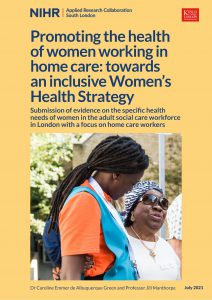 Caroline Emmer De Albuquerque Green, NIHR ARC South London Post-Doctoral Fellow at the NIHR Policy Research Unit in Health and Social Care Workforce, introduces a new report on the promotion of the health of women working in home care, which she co-authored with Unit Director Prof Jill Manthorpe.
Caroline Emmer De Albuquerque Green, NIHR ARC South London Post-Doctoral Fellow at the NIHR Policy Research Unit in Health and Social Care Workforce, introduces a new report on the promotion of the health of women working in home care, which she co-authored with Unit Director Prof Jill Manthorpe.
Women make up the majority of the home care workforce. They provide essential support to people in the community with social care needs. But, the specific health needs of women working in home care have largely gone unrecognised and unmet. The health of home care workers is not just of interest at times of pandemic; it matters in addressing staff turnover, continuity of care for their clients, sickness absences but also the long-term impact on women’s later lives.
 In our report, Submission of evidence on the specific health needs of women in the adult social care workforce in London with a focus on home care workers, we summarised what is known about the specific health needs of women working in home care. The report is co-produced with the assistance of the Proud to Care Board of the Association of Directors of Adult Social Services (ADASS) London which includes home care providers, London Boroughs and other stakeholders.
In our report, Submission of evidence on the specific health needs of women in the adult social care workforce in London with a focus on home care workers, we summarised what is known about the specific health needs of women working in home care. The report is co-produced with the assistance of the Proud to Care Board of the Association of Directors of Adult Social Services (ADASS) London which includes home care providers, London Boroughs and other stakeholders.
We submitted it as evidence to the Department of Health and Social Care’s consultation on a new Women’s Health strategy. From what is known, we concluded the following points to consider in such a new strategy:
- Research is needed to see how home care occupations can be health-enhancing not health damaging. How can risks be minimised and positive aspects of the work amplified? Serious consideration should be given to the health of the social care workforce in any reform of adult social care and workforce health and wellbeing should be emphasised in this and in the proposed Women’s Health Strategy.
- London’s home care workforce offers much learning for other places and sectors. The majority are not UK born and are from an ethnic minority; if we get women’s health right for them then we will have learned much about addressing inequalities and how to ‘level up’.
- As well as addressing specific health problems, multiple problems or long-term conditions need to be recognised in any Strategy.
- Coronavirus pandemic support will need to be long-term for people who are in work, need to change their work and who may contribute to society in other ways.
- The Strategy needs to address why social care systems are so reliant on zero-hour contracts and acknowledge their health impacts so that it can support changes that are more health enhancing for women, and others.
- A Women’s Health Strategy could support dementia prevention but also needs to support the largely female dementia care workforce by acknowledging its skills and needs for recognition, reward and further work-related capacity building.
- The pandemic highlights the urgency of answering questions around specific health needs and behaviours of women in adult social care from non-white ethnic backgrounds. Consultation on the ‘right’ questions and approaches should involve care workers, and managers.
- More specific evidence is needed on the impacts of the pandemic on the health and wellbeing of women working in adult social care generally and in home care specifically to inform any future crisis but also recovery from the pandemic.
- The impact of Long Covid on home care workers needs exploring so that effective support and readjustment can be offered. Data from Wales (linking individual health records and home care worker registration) are likely to be useful in the Covid-19 period but also subsequently for policy makers and employers.
- The Strategy must build on the evidence to best support women working in the sector to receive the Covid-19 and other vaccinations for their protection against the on-going health threats of viruses and other infections.
The full report is available to download here.
Caroline Emmer De Albuquerque Green is NIHR ARC South London Post-Doctoral Fellow at the NIHR Policy Research Unit in Health and Social Care Workforce.